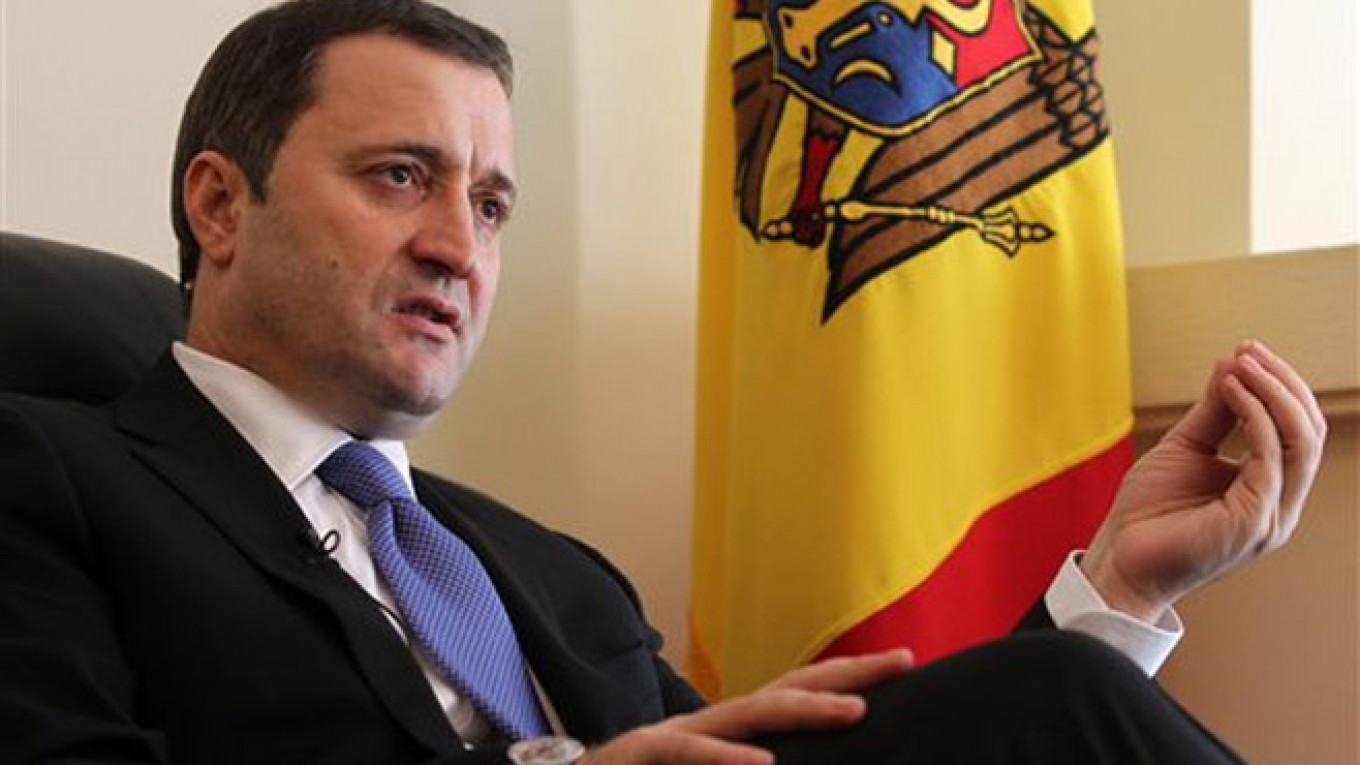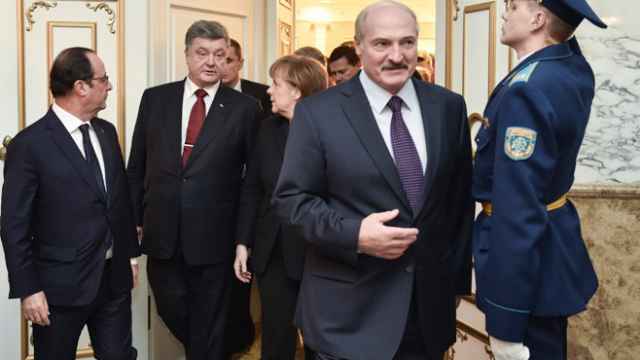What do statesmen and countries that promote the spread of democracy, rule of law and market economies do when the individuals and parties they back become the object of well-founded popular anger and protest? In more direct terms, what does one do when one's own guys turn out to be the crooks?
The European Union and the United States find themselves faced with such a dilemma now in Moldova. For weeks Moldova has had its own "Maidan," with small tent cities and gatherings of protestors in front of the government and parliament buildings. Moldova's civil society and opposition parties are demanding the removal of and accountability for those in the ruling coalition parties who allegedly facilitated the theft in November last year of $1 billion from three Moldovan banks.
On Oct. 15 former Prime Minister Vlad Filat, leader of the Liberal Democratic Party of Moldova (PLDM), largest in the ruling coalition, was stripped of his parliamentary immunity as a deputy and led out of the legislative chamber in handcuffs for allegedly receiving $250 million in bribes and kickbacks for his reputed part in the bank fraud scheme.
There is a wealth of publicly available information about the bank fraud. Shortly after the scale of the theft became apparent, the government commissioned an investigation by the private U.S. firm Kroll, whose report was leaked last spring and showed that many prominent Moldovan political figures, including independent Moldova's second president, Petru Lucinschi, held stock in the banks involved. The Kroll report uncovered some of the malpractices and misdeeds of the banks in the scandal, but could give no hint of where the money ended up.
Further investigation has attributed primary responsibility for the theft to the young Moldovan oligarch Ilan Shor, who was elected mayor of the small historic town of Orhei, just to the north of the capital Chisinau, in the local and municipal elections last June. Shor has evidently admitted some part in the scheme, and apparently is cooperating with prosecutors, at least insofar as they are investigating Filat and his PLDM colleagues. In mid-October the transcript of Shor's testimony to the procurator about his cooperation with Filat was leaked to the press.
Meanwhile Renato Usatii, the left-wing mayor of Balti, Moldova's second-largest and most heavily Russophone city, released to the press what are identified as Moldovan security service intercepts of conversations between Filat and Shor. The exchanges purport to establish the complicity of both in the bank scheme. Usatii was arrested for the leak by Moldovan security forces last week at Chisinau airport, upon his return to Moldova from Moscow.
However lurid the evidence already in the press and however damning to those named in the leaks, these revelations do nothing to instill confidence that we know the full extent of the bank scandal or all of the current Moldova political and business figures involved. In particular, Filat's chief rival and Moldova's richest oligarch Vlad Plahotniuc, deputy head of the governing coalition's Democratic Party (DP), resigned his parliamentary post but did not leave the party. Plahotniuc and his DP colleagues remain in charge of most of Moldova's institutions of policing and justice. Given the long and bitter rivalry between Filat and Plahotniuc, it is hard to weigh how much credence to give to current Moldovan government efforts to investigate the crime and punish the guilty.
Meanwhile the governing coalition is staggering and barely holding on to power. An amalgam of representatives from Moldovan civil society has coalesced into a protest movement called Dignity and Truth (DA), whose leaders have turned out huge crowds demanding to "take back the country" from the crooks in power. The DA protestors have been joined by Igor Dodon's Socialist Party and Renato Usatii's Our Party, who have mounted demonstrations, blocked traffic, joined the tent cities in front of the government buildings, and demanded resignation of the government and early elections.
The government's status and prospects are murky. Joined by Mihai Ghimpu's Liberal Party after resignation of the minority coalition government under Kiril Gaburici, which was tacitly supported by former president Vladimir Voronin's Communists, the current coalition enjoys a bare parliamentary majority. However, both the PLDM and PD have suffered defections, and there is no certainty how long the current rulers can hold onto their majority. Under such circumstances, assurances from high Moldovan government officials of their dedication to tough reforms regarding rule of law, corruption, justice, and the business climate seem to ring hollow.
The results of the municipal and local elections last June appear to show the roughly equal division of the Moldovan electorate between pro-West and pro-Moscow voters which has characterized recent Moldovan elections. Dodon and Usatii seem to be riding high for the moment, but experience suggests that their poll numbers may turn out to be softer than they look. Nonetheless, if parliamentary elections are held any time soon, there appears to be a real possibility that the current coalition would be replaced by avowedly pro-Moscow parties.
However, the European Union and the United States seem to have understood the effects and implications of the bank scandal, and have taken a tough line toward the "pro-European" forces which they formerly supported. Public statements from Brussels and Washington have generally called for "real reforms," not just show, and imply strict conditionality.
EU and American officials appear to comprehend that any failure to vigorously prosecute those pro-Western politicians who engineered the bank fraud would simply drive more of Moldova's exasperated voters into the arms of Dodon and Usatii.
Moldova's recent troubles are further evidence of the general weakness of public institutions in all of the former Soviet states, especially those agencies charged with regulation and promoting rule of law. Even countries like Moldova, Ukraine or Georgia, which have relatively good records of holding free and fair elections, suffer grave deficiencies in governance and institutional capacity. In addition, Moldova is a very small country that has lost an enormous portion of its adult, educated population, and suffers from a huge deficit in capable public officials.
The real solution to Moldova's ills is in the long term, through the building of effective, transparent public and private institutions, with an adequate reservoir of educated Moldovans to staff them. This of course does not address the short term problem of an angry, frustrated populace, which may well turn to the Socialists and Our Party out of desperation.
One must keep in mind, however, that Moldova's electorate is split and likely to remain so. While even the most ardent supporters of pro-European parties are disillusioned with the current crowd in power in Chisinau, it seems unlikely that these same voters either desire or will countenance a long-term, close embrace with Moscow.
Moldova's population has consistently demonstrated a desire to be part of Europe, even if they also wish their country to maintain good relations with Moscow. But whatever Moldova's long-term geopolitical orientation, the country will continue to be poor, unstable and unhappy until it can build honest, transparent, efficient institutions to manage its public affairs and govern fairly and honestly.
William H. Hill served two terms as head of the OSCE Mission to Moldova. The opinions expressed here are the author's own.
A Message from The Moscow Times:
Dear readers,
We are facing unprecedented challenges. Russia's Prosecutor General's Office has designated The Moscow Times as an "undesirable" organization, criminalizing our work and putting our staff at risk of prosecution. This follows our earlier unjust labeling as a "foreign agent."
These actions are direct attempts to silence independent journalism in Russia. The authorities claim our work "discredits the decisions of the Russian leadership." We see things differently: we strive to provide accurate, unbiased reporting on Russia.
We, the journalists of The Moscow Times, refuse to be silenced. But to continue our work, we need your help.
Your support, no matter how small, makes a world of difference. If you can, please support us monthly starting from just $2. It's quick to set up, and every contribution makes a significant impact.
By supporting The Moscow Times, you're defending open, independent journalism in the face of repression. Thank you for standing with us.
Remind me later.






